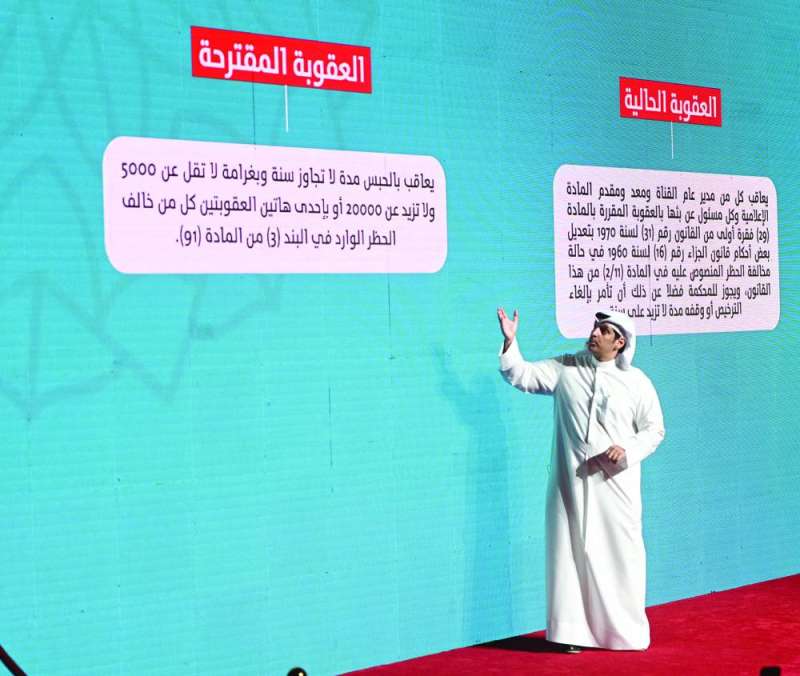In a novel governmental approach, Abdul Rahman Al-Mutairi, the Minister of Information and Minister of Endowments and Islamic Affairs, set a ministerial precedent by addressing the contentious aspects of the draft media regulation law.
He eliminated the conflicting points and crises that surfaced in the initial draft, placing the responsibility for further action in the hands of the National Assembly and the Educational Committee of the National Assembly, which will carry the draft forward for review, reports Al-Rai daily.
Titled ‘The Media Regulation Law… Everyone’s Responsibility,” the discussion panel convened to discuss the revised draft of the law. During the session, Al-Mutairi presented the new draft consisting of 9 chapters and 104 articles, conveying reassuring messages to various stakeholders – media, parliamentary, and public. He emphasized that the law aims to enhance media freedoms, taking into consideration all observations in the best interest of Kuwaiti media.
Minister Al-Mutairi outlined the prohibitions pertaining to the current media laws, namely the Press and Publishing Law, the Electronic Publishing Law, and the Audio-Visual Law, and compared them with the provisions of the draft.
In the draft, penalties for media violations were streamlined to a single reference, with penalties clearly defined within its texts, eliminating any reference to other laws. Penalties were limited to the violator alone, excluding punitive action against the media outlet or its responsible personnel. Additionally, the penalty of facility closure was removed, and certain texts were refined to prevent ambiguity. Al-Mutairi emphasized, “We have established a dedicated law to safeguard journalists and the media, promoting greater freedoms.”
Addressing criticism related to the Emir, the Minister of Information highlighted, “Regarding criticism of His Highness the Emir, it carries a severe penalty.” He further explained, “In the existing laws, criticism was interpreted as attributing a word or action to him. However, the draft now explicitly labels any criticism as prohibited, aligning with the constitutional provision protecting the Amir’s person. Any utterances or actions attributed to His Highness the Amir and His Highness the Crown Prince will incur a fine if not explicitly clarified.”
Highlights of the draft law
— Creating and organizing commercial advertisements through social media
— Developing and organizing media coverage of the elections
— Regulating prohibitions and penalties in all media outlets
— Cancellation of referral to any other law and the most severe penalty
Penalties
1 – Infringing on the divine entity, the prophets, the companions, the wives of the Prophet (may God bless him and grant him peace), or the family of the Prophet.
• Punishment: Imprisonment for a period not exceeding one year, a fine not less than 10,000 and not exceeding 40,000, or one of the two penalties.
2 – Criticizing the person of His Highness the Amir of the country
• Punishment: Imprisonment for a period not exceeding one year, a fine of not less than 5,000 and not more than 20,000, or one of the two penalties.
3 – Attributing a statement or action to His Highness the Emir and His Highness the Crown Prince without special written permission from the Amiri Diwan or the Diwan of His Highness the Crown Prince.
• Punishment: a fine of not less than 5,000 and not more than 20,000.
4 – Incitement to overthrow the regime
• Punishment: imprisonment for a period not exceeding one year, a fine not less than 5,000 and not more than 20 thousand, or one of the two penalties.
5 – Violating public morals
• Punishment: a fine of not less than 3,000 and not more than 10,000.
6 – Infringing on people’s dignity or religious beliefs and inciting hatred or contempt for any group of society.
• Punishment: a fine of not less than 3,000 and not more than 10,000.
7 – Harming relations between Kuwait and other Arab or friendly countries in a manner characterized by hostility
• Punishment: a fine of not less than 3,000 and not more than 10,000.
8 – Publishing any data, information or documents that the Constitution or any law has determined to be confidential or not to be published
• Punishment: a fine of not less than 3,000 and not more than 10,000.
• The penalties stipulated in the draft law stipulate that “the criminal court may order the suspension of the license for a period not exceeding one year, the confiscation of prohibited media or advertising materials, and the seizure and destruction of the copy and the original support on which it is affixed.”

